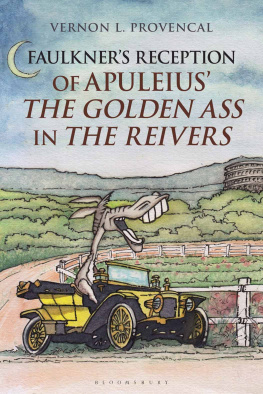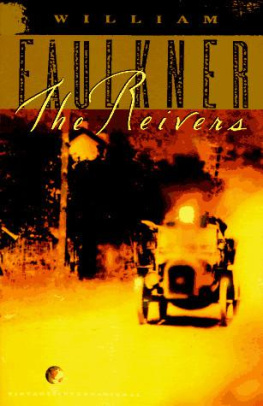
Faulkners Reception of Apuleius The Golden Ass in The Reivers
To our children and grandchildren,
sisters and brothers, parents and grandparents,
extended families and dearly departed.
In Memoriam
Neil E. Tibert (19662015)
Richard C. Tibert (19412019)
Bloomsbury Studies in Classical Reception
Bloomsbury Studies in Classical Reception presents scholarly monographs offering new and innovative research and debate to students and scholars in the reception of Classical Studies. Each volume will explore the appropriation, reconceptualization and recontextualization of various aspects of the Graeco-Roman world and its culture, looking at the impact of the ancient world on modernity. Research will also cover reception within antiquity, the theory and practice of translation, and reception theory.
Also available in the series:
Alexander the Great in the Early Christian Tradition: Classical Reception and Patristic Literature, Christian Thrue Djurslev
Ancient Magic and the Supernatural in the Modern Visual and Performing Arts, edited by Filippo Carl-Uhink and Irene Berti
Ancient Greek Myth in World Fiction since 1989, edited by Justine McConnell and Edith Hall
Antipodean Antiquities, edited by Marguerite Johnson
Classics in Extremis, edited by Edmund Richardson
Frankenstein and its Classics, edited by Jesse Weiner, Benjamin Eldon Stevens and Brett M. Rogers
Greek and Roman Classics in the British Struggle for Social Reform, edited by Henry Stead and Edith Hall
Greeks and Romans on the Latin American Stage, edited by Rosa Andjar and Konstantinos P. Nikoloutsos
Homers Iliad and the Trojan War: Dialogues on Tradition, Jan Haywood and Naose Mac Sweeney
Julius Caesars Self-Created Image and Its Dramatic Afterlife, Miryana Dimitrova
Once and Future Antiquities in Science Fiction and Fantasy, edited by Brett M. Rogers and Benjamin Eldon Stevens
Reading Poetry, Writing Genre, edited by Silvio Br and Emily Hauser
Sex, Symbolists and the Greek Body, Richard Warren
The Codex Fori Mussolini, Han Lamers and Bettina Reitz-Joosse
The Classics in Modernist Translation, edited by Miranda Hickman and Lynn Kozak
The Gentle, Jealous God, Simon Perris
Translations of Greek Tragedy in the Work of Ezra Pound, Peter Liebregts
Victorian Epic Burlesques, Rachel Bryant Davies

Contents
Tammy-Lynn Provencal
Although I am not an academic, helping my husband with his research for this book has been enjoyable, and I am happy to provide the foreword for an academic project that enabled us to work and have fun together in the process, even if sometimes it seemed to take forever.
When Vernon first decided to write a book that would be in part about William Faulkner, it sparked an interest in me. Somehow I went through high school and university without having to read any Faulkner. But I had my own interest in and personal struggles with The Sound and the Fury, which over a twenty-year span I had tried to read many times, yet failed. The only Faulkner book I had managed to read on my own all the way through was Light in August. For Vernons research, we added the complete Faulkner collection to our library, so I began reading all I could manage. I started with early Faulkner, then proceeded to The Sound and the Fury which I finally succeeded in finishing, and went on to read his later stories and novels. By this time books about Faulkners life started showing up, so I began reading them as well. So that is basically how I came to be involved in the project for this book.
In October 2015, we made a research trip to Charlottesville, Virginia, and Oxford, Mississippi. My brother Neil and his family lived in Fredericksburg, Virginia, at the time, so a family visit paired with research, who could ask for more? (Im so glad that Neil and I got to spend a memorable afternoon together at Thomas Jeffersons Monticello.) Several days were spent in the archives of the University of Virginia doing research, going through boxes of Faulkners papers in search of anything related to The Reivers. To my great good fortune, I was the one to find Faulkners original typescript for The Reivers; it was an exciting moment and I found myself really enjoying helping with this aspect of the research. The University of Virginia campus is amazing, the staff in the archive building were very friendly, and it was such a relaxing atmosphere. At this point in the journey, I found that I could help explain to other non-academics like myself what Vernons book was going to be about.
From Charlottesville we headed to Oxford, home of William Faulkner and Ole Miss, the University of Mississippi. The university archives turned out to be closed because of mould, but we learnt to our surprise from the archivist that Ole Miss housed a collection of traditional Newfoundland music! We had to fly into Memphis and take a taxi to Oxford, basically retracing the automobile route taken between Jefferson and Memphis in The Reivers. It was mid-October when we got there and about 95 degrees Fahrenheit; they had had a dry summer. It was exciting and surreal to be in Oxford; it had kept its charm and historical appearance. Our visit to Oxford and Rowan Oak gave me a real sense of how much Faulkner had drawn on life in his home town for his novels that I had been reading. Faulkners fictional town of Jefferson and Yoknapatawpha County are based on Oxford and Lafayette County. As you drive through the town, you can picture scenes from his novels. We headed out on foot to Rowan Oak which had been Faulkners home and is now a museum. We walked through an area called Baileys Woods and during this walk I was able to place myself in many of Faulkners novels. While crossing over a wooden bridge, all I could think of was As I Lay Dying, and how the bridge in it was washed out by a heavy summer rainstorm.
Now on to Apuleius and The Golden Ass, which I went on to read as well. In July 2016, we headed off to the University of Leeds to attend a conference on the reception of Cupid and Psyche, where Vernon was presenting on its reception in The Reivers. Again we were able to visit family in Scotland, so another plus for the academic trip. The conference proved to be entertaining and interesting to myself as a non-academic. The Cupid and Psyche myth showed up in early-eighteenth-century childrens books, French wallpaper and the movie Pans Labyrinth, just to name a few.
By this time I agreed to contribute a written piece to the book in some way, since I was actively involved in its preparation. Over the course of four years it had evolved from maybe writing something on Faulkners fictional Yoknapatawpha that interested me so much to what you are reading right now in this foreword, which I hope will give many of our family and friends who are non-academics a part of the book that they can all read and understand. You never know, maybe it will be enough to get them to read the whole thing.
I am honoured to have written this foreword, and I hope that you will enjoy our book.
This work has been enabled by research funds and sabbaticals granted by Acadia University in Wolfville, Nova Scotia, and has profited from presentations to the
Next page










